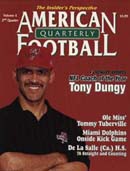AMERICAN FOOTBALL MONTHLY THE #1 RESOURCE FOR FOOTBALL COACHES
Article CategoriesAFM Magazine
|
Wisdom in a Multitude of CounselorsA Financial Model for the Professional Playerby: Thom Park, Ph.D., Associate Professor, Florida State University © More from this issue The NFL Draft covered so colorfully this April by an array of ESPN expert commentators has once again captivated the American football psyche with an over-analysis of this "game within the game." The annual reloading of America's major college and professional football teams through the recruiting and drafting process challenges to exceed the game itself in importance. Any wise coach knows having the right names on the backs of the jerseys can overcome any number of coaching shortfalls. The personnel evaluation and acquisition process culminating for the new pros in the NFL Draft designates in seven rounds those 210 fortunate players who have an immediate shot at a financial independence scant few of their college classmates may ever enjoy. As a coach, you may have observed one of your "once-in-a-career" prodigy players g....The full article can only be seen by subscribers.
|
|
|||||||
| HOME |
MAGAZINE |
SUBSCRIBE | ONLINE COLUMNISTS | COACHING VIDEOS |
Copyright 2025, AmericanFootballMonthly.com
All Rights Reserved





